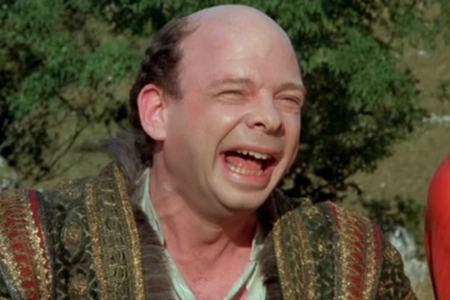Over the years, I’ve played a ton of games where the PCs had hit points and didn’t need them. It took me a long time to figure out why that was a problem.
If the PCs in an RPG have hit points — used here to mean “a stat which determines whether a character is alive or dead” — and the actual game being played with that RPG at the table doesn’t include a real chance that PCs can die, it’s the wrong RPG for that game.
I think of that mismatch like this: Is death on the line, or isn’t it? If it’s not, we should play something else; if it is, then cool.

(The words “death on the line” instantly cause this scene from The Princess Bride (paid link) to replay in my head.)
Emulation and mismatches
In my experience, this mismatch happens most often with games intended to emulate a licensed property, since they’re necessarily more closely associated with a different medium for storytelling than other RPGs. But it also comes up with games that the group wants to feel like a TV show, or a movie, or a novel — media where the story is under someone’s control.
In Star Trek: The Next Generation, Captain Picard is never going to get killed by a stray disruptor blast from Romulan #3. It just wouldn’t be good TV. So why do the PCs in Star Trek RPGs have hit points?[1]
If those hit points don’t mean anything, that’s a fundamental disconnect between what we say we’re doing at the table — playing a game where the PCs can die — and what we’re actually doing. The illusion of those hit points meaning something is wholly unsatisfying in play.[2]
The PTA question
When I hear “I want the game to feel like [a TV show],” a version of the Risus question[3] immediately pops into my head: “Why aren’t we playing this game with Primetime Adventures?”
PTA is designed, from the group up, to emulate TV shows. In play, it ticks along like a Swiss fucking watch, sublimely in sync with its stated design goals, as it does exactly what it says on the tin. Nothing needs to be ignored (like hit points) for the game to feel like a TV show, but it simultaneously and explicitly embraces the fact that it’s a roleplaying game. It’s brilliant.
In a PTA Star Trek game, no one has hit points. Picard only gets killed by a disruptor bolt if his player wants him to die (likely because it would feel right for the episode and for the show as a whole). The show isn’t about random character deaths, so neither is the RPG. Poof! Mismatch neatly avoided.
The older I get, the less willing I am to play RPGs where portions of the rules have to be ignored — whether overtly or covertly — to get them to work as desired.
[1] I’m using Star Trek as an example, but the same goes for Star Wars, Doctor Who, or [insert many, many things that have been translated into RPG form here].
[2] The knock-on problem is that there’s now a whole swath of the game that we probably don’t really need. What’s the whole combat system for if the PCs can’t die? Why is there a section about what to do when a PC dies?
[3] “Can Risus do this?” If Risus can do it, and do it as well as RPG X, do I really need RPG X?
